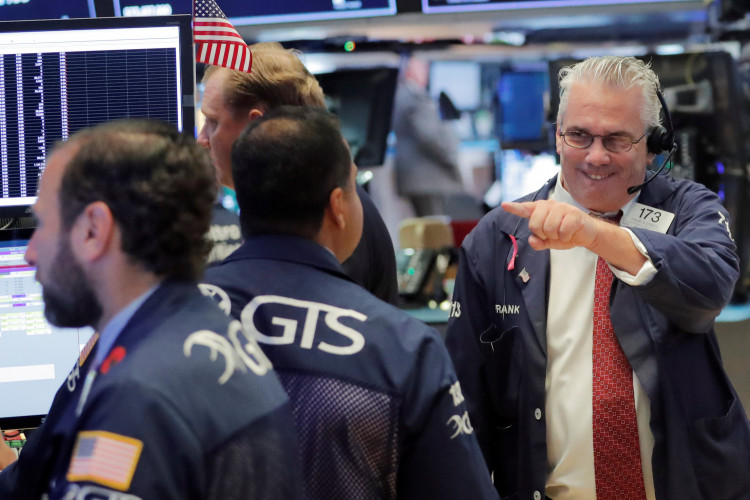The Dow Jones Industrial Average surges by 429 points on Aug. 16, hitting the biggest one-day gain since April upon news that the world's two biggest economies opened its doors to new rounds of trade discussion.
Specifically, Dow rose 396.32 points to 25,558.73. The upsurge was propelled by companies that are heavily reliant on trading. Shares of Boeing rose 4.3 percent while Caterpillar was up by 3.2 percent. Apple stock reached another all-time high, gaining 1.4 percent on Thursday.
Elsewhere, the S&P 500 rose by 0.8 percent to 2,840.69 and Nasdaq Composite advanced 0.4 percent to 7,806.52. Investors were also excited by strong quarterly results delivered by Walmart and Cisco Systems.
News on resumed China, US trade war talks also pushes bourses in Europe to climb higher on Thursday. The pan-European Stoxx 600 rose at 0.53 percent while FTSE 100 in London ended the bells with 0.87 percent higher.
Randy Frederick, vice president of trading and derivatives at the Schwab Center for Financial Research, believed that the impressive market movement was almost entirely related to US-China relations. He told CNBC that while trade tensions are not yet resolved, the willingness for both parties to engage in discussion is enough for the market to perform remarkably.
This is the same opinion held by Chris Zaccarelli, chief investment officer at Independent Advisor Alliance. Zaccarelli told USA Today that the market was definitely being held back by the US-China trade tensions. If the conflicts are mended sooner, the U.S. stock market may bounce back to its all-time highs once again, Zaccarelli added.
At the invitation of the United States, China is sending its delegation headed by Vice Minister of Commerce Wang Shouwen to meet with U.S. Treasury Under Secretary for International Affairs David Malpass. The dialogue is reportedly scheduled on Aug. 21-22 according to the Wall Street Journal. Both nations are set to impose new rounds of tariffs on $16 billion of their respective products on Aug. 23.
While there was widespread optimism on news of the renewed talks, analysts remained doubtful that the two nations will decide to end the trade conflicts abruptly. Sources from both the United States and China's side believed that discussions may only involve arrangements on how to balance the market as tariffs persist. The sources told Reuters that if a big decision is going to be handed down that day, the United States should have sent officials from the Treasury Department Office which remains the major decision-maker on the matter.
Indeed, White House Economic adviser Larry Kudlow underscored President Donald Trump's strong determination to continue with the trade war unless China amends its alleged wrongdoings on trade practices and intellectual properties.
Analysts may have found a strong basis behind their doubts with how previous discussions have unfolded. In May, China was assured that the United States would no longer continue with its tariffs on Chinese goods. Ten days later, however, the White House imposed taxes on $50 billion of Chinese products.






